2nd Sunday in Ord. Time - Year A
Isaiah 49:3,5-6; Ps. 39: 2,4.7-10; Gospel of John 1:29-34
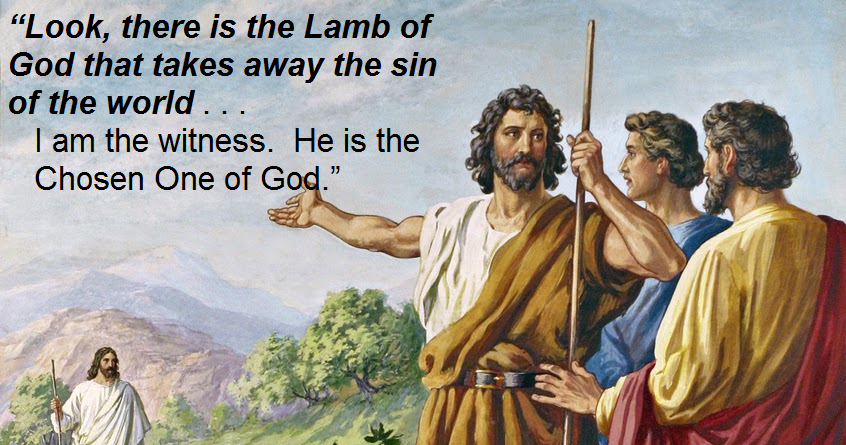
Preached by Msgr Philip Heng, SJ at Cathedral of Good Shepherd, Singapore on 19 January 2020
In today’s Gospel that we just heard proclaimed, John the Baptist, seeing Jesus coming towards him announced with clarity, confidence and courage to the crowd, “Look, there is the Lamb of God that takes away the sin of the world . . . I am the witness. He is the Chosen One of God.” Would we witness to such truth of Jesus in our daily living?
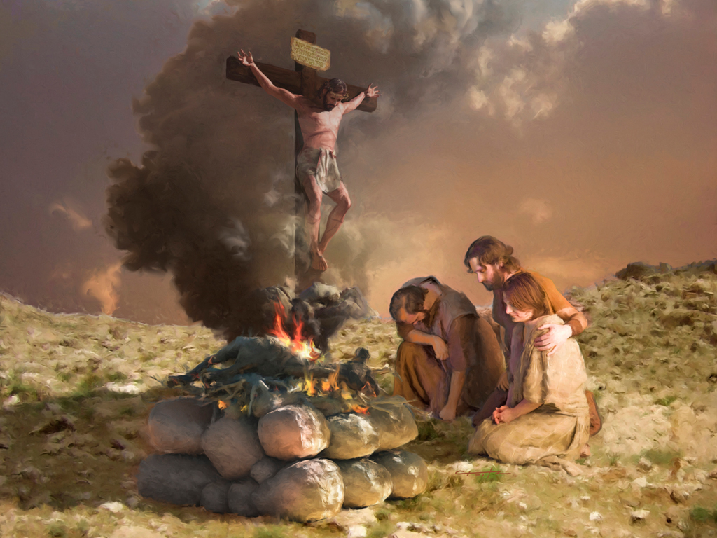 We know from the Old Testament that God provided a ram that found itself caught in a bush to Abraham for the sacrifice in place of Isaac his son (Gen.22:9-14). In the Old Testament, unblemished lambs without physical defects are offered up to God in the Temple as “sacrificial lambs” to receive God’s forgiveness for sinners. In the Offering ritual, when the sinner puts his hands on the sacrificial lamb, he transfers all his sins on to the animal. And so, when the sacrificial lamb is killed and offered to God as a sacrifice, the sins of the sinner are forgiven.
We know from the Old Testament that God provided a ram that found itself caught in a bush to Abraham for the sacrifice in place of Isaac his son (Gen.22:9-14). In the Old Testament, unblemished lambs without physical defects are offered up to God in the Temple as “sacrificial lambs” to receive God’s forgiveness for sinners. In the Offering ritual, when the sinner puts his hands on the sacrificial lamb, he transfers all his sins on to the animal. And so, when the sacrificial lamb is killed and offered to God as a sacrifice, the sins of the sinner are forgiven.
It is with such a Jewish background that when John the Baptist publicly points out and proclaims that Jesus is “The Lamb of God who will takes away the sins of world,” he was foretelling that Jesus will be the “Sacrificial Lamb” who would Suffer and Die for the forgiveness of the sins of mankind. In each Eucharist that we celebrate, Jesus Christ is the Lamb of the Sacrificial Meal (1 Cor. 5:7; Exod. 12:6-10).
My brothers and sisters in Christ, if Jesus is the “Sacrificial Lamb” who willingly and freely offered Himself to be persecuted, scourged, crowned with thorns, crucified and eventually die for the sins of all of humankind, and that through His Resurrection and Ascension, He opened the gates of heaven and offered us the gift of eternal life after we die, then the first and most basic question that you and I need to reflect on as Catholic Christians is, “Am I living my Catholic faith, in the ways that Jesus has taught and shown us through His life?” This is an important question to reflect on, so that the Suffering and Death of Jesus, as the “Sacrificial Lamb” is not done in vain, and wasted so to speak.
Take the case of the true story of a parent David, (not his real name), who had to work so very hard to bring up his four children. Of the four children, one of them Jack (not his real name) was particularly intelligent. So, with high hopes, the father worked very hard to save money for the children’s education and especially for Jack to excel, which he did; and eventually graduated from the renown Oxford university.
To make a long story short, Jack’s behaviour and attitude toward his family changed upon his return. He was very career minded and focused on becoming successful and rich. He eventually got married and had a son. Jack and his wife became so materialistic and elitist that they were ashamed of their parents who were poor. So, Jack and his wife never spoke about his parents and family who lived in simplicity and poverty. They never visited the family, and did not welcome their parents to their home, and not even allowed them to carry his son . . .
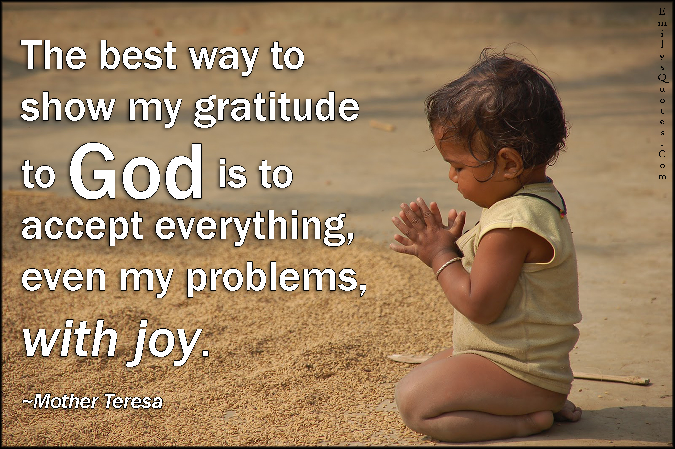 My sisters and brothers in Christ, in this true and heart wrenching story of the ingratitude of Jack and his wife, do you think they are living a happy and fulfilling life? Do you think their unrepentant, materialistic and self-centred ways of living will give them peace, meaning and happiness in their lives?
My sisters and brothers in Christ, in this true and heart wrenching story of the ingratitude of Jack and his wife, do you think they are living a happy and fulfilling life? Do you think their unrepentant, materialistic and self-centred ways of living will give them peace, meaning and happiness in their lives?
However, let us not judge Jack and his wife too harshly and too hastily. This is because we first need to reflect on the type and quality of our own lives. And so, the first question you and I need to ask ourselves is, “Do we have hearts that are grateful to God for all the abundant blessings, infinite sacrifices and divine mercy that God has shown us?” Jesus not only made all these many painful sacrifices for us, as David made for his son Jack. Jesus, as the “Sacrificial Lamb”, the Son of God, also suffered and died for our sins so that you and I can receive the gift of Eternal Life after we die.
Jack’s ingratitude towards his parents had hurt them deeply, and their “self-centredness” is a grievous sin that dishonours and destroys the love he ought to have for his parents. Likewise, if our hearts are ungrateful to God, then the gravity of sin of our “self-centredness” would be infinitely more serious than Jack’s ingratitude for his father.
As such, my brothers and sisters in Christ, let us then turn our reflection on John the Baptist’s life and draw inspiration from him. John the Baptist lived the mission of his life with great fidelity and passion. He was totally focused on preparing and pointing all his followers to Jesus, the Messiah, the Chosen One of God. He preached and lived without any self-glory, but only to glorify God; and in the end was beheaded for speaking the Truth.
In short, John the Baptist lived his mission from God with great humility. Spiritual writers, including St Ignatius of Loyola, tell us that the virtue of humility is essentially, living our lives in accordance to God’s Will, God’s Love and for God’s Greater Glory.
 More concretely, let us then reflect on the qualities of what the virtue of humility is like with some illustrations and ask ourselves, “Am I such a person, in the way I live and relate to God?”
More concretely, let us then reflect on the qualities of what the virtue of humility is like with some illustrations and ask ourselves, “Am I such a person, in the way I live and relate to God?”
Let us call the first person who lives the virtue of humility Michelle. Michelle is a young adult who works very hard; very conscientiously, and very professionally. She takes good care of her parents and treats them with great respect and gratitude, more so as she is the only child. Michelle, shares her talents, time and treasures with the Church. She also shares some 10 percent of her monthly income for the social mission of the poor, and clearly she has a joy in her disposition that can only come from the love she has for God. Michelle never fails to edify and inspire me with her joyous love God.
The second person of humility is Molly. Molly is in his early sixties; she has four children. Her youngest son at the age of three suffered a serious illness and since then, for the past twenty years, has been bedridden and is unable to speak. Molly and her maid, each takes 12 hours shifts. Molly attends daily Mass, and even as her crosses for the past 20 years were very heavy, Molly continues to persevere in her faith. She says, “God is my strength. My son, is also blessing and gift from God. I have learnt to love Christ more deeply through the crosses that I have to carry each day.
The third person of humility is Matilda. Matilda is a mother of three children and several grandchildren. Matilda has brought up all her children in the Catholic faith. She has gone through many painful challenges in her life, but she is always grateful to God for all the blessings she received in her life. Matilda, now in her late seventies, is still serving the Church in different ministries and during the weekdays, visit elderly homes, and bring them Holy Communion. Matilda, prays and attends Mass daily, and says, “In my busyness, I never short change the quality time I give to my family, who understands and accepts the service I give in the Church.
 In contrast to virtue of humility, let us reflect on what the sin of pride may look like. For a person of pride, like us call him Marcus, he could be a person who is so self-absorbed that he does not think he has to listen to anyone’s views. He is always right and if his views are not accepted, then he thinks that people are prejudiced against him, or they are envious and jealous of him and wants to control the life he leads. However, what really is happening to Marcus in his pride, is that he is suffering from severe low self-esteem and insecurity and projects all these through his arrogance. But, deep within him, he feels empty and miserable.
In contrast to virtue of humility, let us reflect on what the sin of pride may look like. For a person of pride, like us call him Marcus, he could be a person who is so self-absorbed that he does not think he has to listen to anyone’s views. He is always right and if his views are not accepted, then he thinks that people are prejudiced against him, or they are envious and jealous of him and wants to control the life he leads. However, what really is happening to Marcus in his pride, is that he is suffering from severe low self-esteem and insecurity and projects all these through his arrogance. But, deep within him, he feels empty and miserable.
The second type of person of pride is like Martin is who is searching for meaning in life, but in the wrong places and with the wrong company of people. He squanders his time, talents and treasures of his health and wealth on superficial forms of gratification, glory and glamour of this world, that he fantasies on daily. Martin knows that he is over indulging in his self-centred living, but is not willing to change. Martin lives only for himself, and does not care even if his family is suffering because of him.
The third type of person of pride is a person like Matthias who is disillusioned with everyone: his family, relatives, friends, the government and the church. He thinks that the whole world is against him; even his wife and children do not understand him. So, Matthias lives in his own world of darkness and daily builds a wall around his lifestyle of immorality and sin. In the worst case scenario, a person like Matthias, gets himself addicted to alcohol, pornography, gambling and even tamper with evil spirits. He rejects and gets angry with God and the Church, and he is totally lost, confused and contemplates that suicide could be a way out of his pain and emptiness.
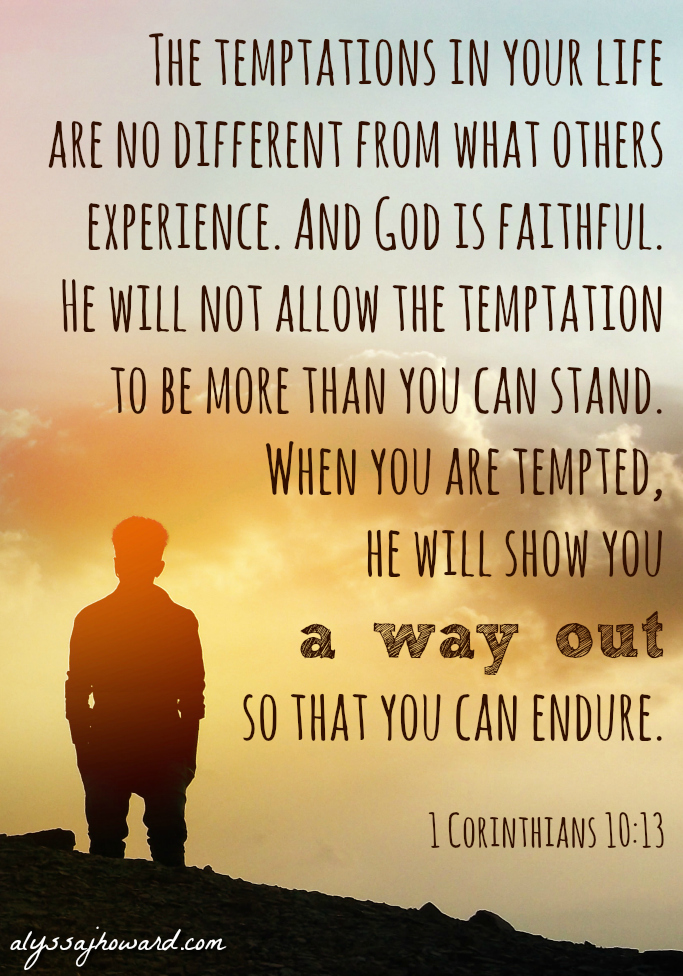 My sisters and brothers in Christ, let me first clarify to avoid any misunderstanding, that the people of humility and pride are not based on gender, and also not based on age specifics, culture, race or whether a person is a laity or a priest or religious. What I have described are brief and general characteristics, attitudes, behaviours and lifestyles of a person who has the virtue of humility or lives in the sin of pride. They could be you, me or any person.
My sisters and brothers in Christ, let me first clarify to avoid any misunderstanding, that the people of humility and pride are not based on gender, and also not based on age specifics, culture, race or whether a person is a laity or a priest or religious. What I have described are brief and general characteristics, attitudes, behaviours and lifestyles of a person who has the virtue of humility or lives in the sin of pride. They could be you, me or any person.
And as I conclude, let us remind ourselves that St Ignatius of Loyola, in his Spiritual Exercises specifies with great wisdom that if, we have the gift of the virtue of humility, the doors of our hearts and life will be open to all other virtues. However, if we have the sin of “pride”, then our hearts are open to allow all other sins and vices to influence, dominate and even destroy our lives and relationship with God.
The very brief reflection on the persons who live the virtues of humility and one who is shackled by the sin of pride, reveal to us the reality that even as we are created by God in His Image and Likeness, which is the innate desire to love, our daily free choices in life, in spite of the abundant graces that God gives us, through the Sacraments, today’s Gospel that presents us with John the Baptist, reminds us that your mission and my mission in life, regardless of who we are, are to be faithful to God’s Will in everything that we do, think and live daily.
Secondly, today’s Gospel also reminds us that Jesus the “Sacrificial Lamb” has sacrificed His life and willingly died for our sake and Salvation. It is our choice of whether we want to change our lives for the better or not. And if sadly, we still do not choose to do so, or at least not willing to commit ourselves to God, as we begin this year 2020, then in many ways we are like Jack in our story, who have chosen to live a life of ingratitude to his father David’s sacrificial love for him, and have chosen to continue to live a life of misery and darkness that resembles the lives of Marcus, Martin and Matthias.
However, if we are open to God’s invitation today, to change for the better, and to live in His Will and Ways, then the abundant graces that God gives us daily and through the Sacraments, will surely enlighten and empower us to break free from any sin of pride, and grow in the virtue of humility that Michelle, Molly and Matilda have shown us, and whom we know, can be achieved with God’s graces.
Indeed, their lives symbolise the greater perfection and holiness of the lives of John the Baptist and Mary, the Mother of Jesus, and ultimately, the life of Christ Himself who lived in the total fidelity His Father’s Will and Ways.
Msgr Philip Heng, S.J.
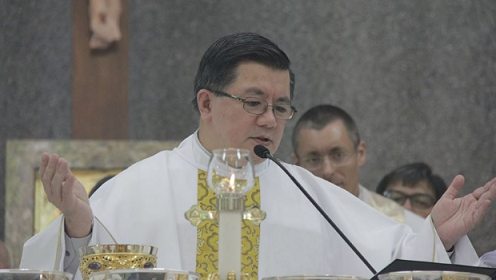
Website-Counter from 20th January 2020
